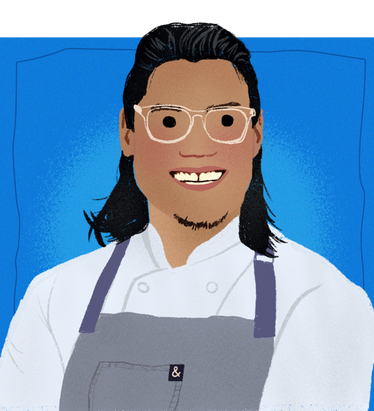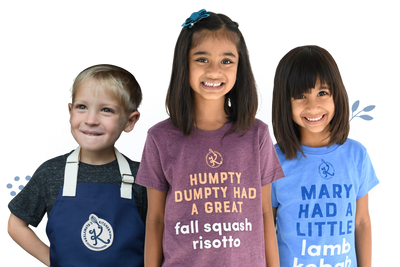
Taste Bud Profile
Byron Gomez

Chef Byron Gomez as a child would have had a hard time believing that he would achieve the success he has achieved today—but he never stopped dreaming about it. His imagination and drive became his signature attributes, and his never-give-up attitude has propelled him to become one of the most notable chefs in the country. With all of his success, he has always prized the ability to be resourceful and creative, traits learned from his mother, above all else. He encourages kids to imagine the impossible and to be willing to fail in pursuit of a dream, but to never give up on that pursuit. As a Dreamer/DACA recipient himself, I can’t think of anyone better suited to share this important message with kids and families.



Byron Gomez: I have really strong memories around the food we’d eat at family gatherings. I know now that they are traditional dishes of Costa Rica, but back then they were just my favorite foods. To me, the foods are tied to these gatherings, to special moments. Everybody used to gather at my house on Sundays. One of my uncles used to drive a minibus for a living, and on Sundays, he’d take a two hour trip to gather up all the family members around, and bring them to my house by 11 o’clock in the morning. We’d split into three groups: the older guys sitting on the couch watching the local soccer league, the kids playing in the backyard, and the moms and my grandma in the kitchen and at the dining room table, chopping away and gossiping. I always gravitated towards the food. I used to play a little, but then I’d always end up breaking away from the group and sitting under the dining table, and I’d get to taste things and have snacks just for me. My mom would make a big batch of arroz con leche, which is typically served hot, but I preferred it cold. So she’d always put away a cup for me in the freezer and I’d sit there and eat it like ice cream. There was something that always drew me there to the kitchen—it gave me comfort, because that’s where my mom was, that’s where this more mellow energy of all the ladies was, and that’s where all of the fun smells and great treats were too.

After I left Costa Rica, I didn’t have those family gatherings anymore. I didn’t have my cousins to play with, and I was in a strange country with a different language and different food. My parents found a way to keep that feeling intact though. They made friends in the church group and started to invite them over on the weekends. They didn’t realize that was hospitality—it was almost like having a restaurant. To me, I grew up with that feeling being normal, and that’s why today I just love what I do for a living. Today, there are three things that always remind me of home and all of those great home cooks I knew. Anytime there’s a hot pan and hot oil and someone throws in garlic, onions, and peppers and I get a whiff of it, I’m immediately like “wow! That’s my mom’s cooking!” It feels like those are “my mom’s” ingredients. Obviously these are everyone’s ingredients but that smell really takes me back to her. Another one is the sound of ripping a bunch of cilantro with your hands, or chopping it with a very dull knife. They never had sharp knives in my mom’s kitchen, which drives me crazy now, but that crunch of slicing a bunch of cilantro and the aromatics that accompany it—that takes me home too. The first thing that comes to mind is freshness, and greenness. It’s something very stimulating. I feel the same about fresh squeezed lime juice—it’s used all the time in our cuisine. Those three things always remind me of home, and I love it every time. My mom could make magical food appear from nothing—like if she put together a pepper, an egg, and a piece of chicken it would somehow be so delicious. We didn’t grow up well off. So her creativity, being able to make something out of very little, was something that was instilled in me early on, and that I still try to honor. When you have abundance, it’s easy to come up with something great. But I take more pride in being able to be resourceful, working with fewer things, and making something delicious. It really feels like you put your all into it.

I think it is so important for kids to know that they have to have a dream. Have the imagination to follow it, sometimes not knowing where it’s going to take you.
I didn’t always know the next step, or how I’d accomplish what I wanted to do—but at least having that feeling inside me drove me and still drives me. Also, just as important as the dream itself, is being consistent in trying, and in failing. You’re going to fail, more than once. But if you can find a way to be consistent in pursuing whatever your dream is, you’ll be able to brush off that disappointment, learn from it, and try again. If you don’t fail, you’re not really trying. Failing is so often seen as negative, but I see it as a positive, and as an opportunity—you will find out so much about yourself, and about how to do things, and do them differently, and then eventually do them better. If you do that enough times, you will succeed. And that grin on your face, and the feeling that you get from that success—nobody can take that from you. Then? On to the next thing.

Because of my immigration status, I’ve never been able to actually travel the world. That’s one thing I’ve always yearned for, and I know that once I’m able to do it, I will take two years off and just do it. But, I’m grateful that for many years, I’ve traveled the world through food. I could pick up a book and learn how to make a recipe from Laos or Thailand. I could talk to a friend who is from Poland and learn how to make the pierogi that his grandma made. I could get inspired by a smell, narrow it down to its usage in Northern African cuisine, and now I’m in Morocco. That’s the beautiful thing about food—you can go anywhere by experiencing it where you are. It’s also amazing that there’s no need to put food in a box—if you look at my cooking, I’m rooted in French techniques, but also in flavors from Southeast Asia. You can look at a traditional European recipe and see that they use vinegar, but maybe I’m going to use lime instead to cut through the acidity of this dish.
You can start with something familiar, but then expand your mind to the possibilities of it. Your own creativity is limitless. That’s what food has been to me—a space with no boundaries, where I’m able to travel.
Nobody can take your drive or your knowledge away from you. There’s a system that might tell you, “we’re putting you in this bracket, and you don’t meet the requirements of what we consider a chef” or whatever—if I listened to that, I would have stopped doing what I love to do. I don’t live by other people’s expectations of me, because if I did, I wouldn’t be here. I’m trying to be the best I can be with my resources, when they’ve been vast and when they’ve been limited. There has never been a DACA recipient on Top Chef before. I was on a show called “National Pride of Costa Rica”. I’ve worked in some of the best restaurants in the world. It would have been hard for me to believe that any of this was possible for an immigrant kid. It was possible because I kept on pushing. I kept on imagining the impossible. I kept saying that at some point, something was going to stick. This persistence has become a trait of mine! And I’m grateful that my platform, Kalamata's Kitchen, lets me tell my story and maybe inspire other immigrant kids or kids who just don’t know that they can do anything. If any kid ever thinks “ok well, this is it for me,” I want to tell them No. That’s not it for you. You are your own worst enemy thinking that way. Don’t limit yourself. Just go out and do it.

I wish Kalamata had existed when I was a kid because it would have given me a broader perspective on how other people feel. Growing up in an immigrant Hispanic community, you’re really in a box, and a lot of people don’t leave that community out of fear, and the feeling that we have to stick together. We don’t want to lose our identity. And if you step out of that box, there’s a lot of fear of failure, and I think sometimes people don’t progress past certain stages of their dreams because those fears are so instilled in them. I think if something like Kalamata’s Kitchen had been available to me, I would have seen the world in a better, more broad way. Maybe I would have made those daring choices earlier, maybe I would have been more educated about food, maybe I would have had the guts to say "hey mom and dad, look—Kalamata says we can do it, so we can do it." Dreams are so important at early stages of our development. Pursue your imagination. Do some crazy stuff. Kalamata’s Kitchen would have given me more confidence and self worth, and maybe a way to prove to my parents and my community as a kid—see? I can do it too.

